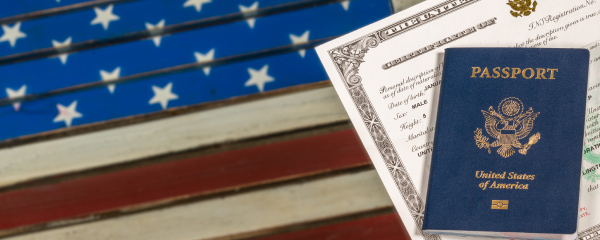It’s the little blue book that Americans love to hate, and it’s just about impossible to cross an international border without it.
I’m referring, of course, to a US passport. If you owe money to the IRS, it might become a lot harder for you to qualify to carry one.
A US passport is the property of the US government. On my US passport (and yours as well) there is a statement which reads:
Free Wealth Protection Insights
Enter your email below to receive our weekly briefings on better ways to preserve your wealth, legally reduce your tax bill, and better protect what you’ve worked hard to build.
The Nestmann Group does not sell, rent or otherwise share your private details with third parties. Learn more about our privacy policy here.
PLEASE NOTE: This e-series will be delivered to you via email. You should receive your first message minutes after joining us. By signing up for this course, you’ll also start to receive our popular weekly publication, Nestmann’s Notes. If you don’t want to receive that, simply email or click the unsubscribe link found in every message.
US GOVERNMENT PROPERTY. This passport is the property of the US government… It must be surrendered upon demand by an authorized representative of the United States Government.
If you’re a citizen of any other country, chances are your passport contains a similar statement. If your government decides it doesn’t want you to travel internationally, it can simply revoke your passport, leaving you trapped in that country.
In the US, Uncle Sam has numerous reasons to revoke, refuse to renew, or decline to issue a passport:
-
If a federal or state court has ordered you to stay in the United States
-
If another country has requested your extradition
-
If you owe more than $2,500 in delinquent child support payments
Even if you don’t fall into one of these categories, don’t assume you can renew your passport when it expires. If the State Department requires you to complete a “biographical questionnaire” as a condition for renewal, you could be hard-pressed to come up with some of the requested information (e.g., details of your mother’s prenatal care).
As in so many other areas of life, the US routinely uses passport revocation to punish political enemies. Indeed, as I discussed in this essay, that’s been official policy for nearly a century.
Now you can add a new item to the list of reasons Uncle Sam can revoke or refuse to renew your passport: owing money to the IRS. In the closing days of 2015, Congress passed a law that gave the State Department the authority to deny, revoke, or limit the passport of any US citizen with delinquent taxes. The revocation provision applies to a tax debt that exceeds $50,000 for which the IRS has issued a lien or levy.
Last month, these rules came into effect, courtesy of an IRS notice. The notice makes clear that the $50,000 threshold applies not only to the total tax you owe for all previous years, but also penalties and interest the IRS has assessed. However, you can keep your passport if:
- You have an IRS-approved installment payment agreement in effect
- The IRS has accepted an offer in compromise and you are making payments in accordance with it
- You have a settlement agreement in effect with the Department of Justice and are making the required payments
- You (or more likely your tax attorney) has suspended collection action by the IRS by requesting a due process hearing
- You have applied for “innocent spouse relief” for tax obligations created by your spouse but for which you would otherwise be responsible as a signatory on a joint return.
The consequences of having your passport revoked are serious. As a US citizen, you cannot legally enter or leave the US without a valid US passport. So, if you live in the US, you’re stuck at home.
If you’re living abroad, the consequences are even worse. Whatever visa you hold that gives you permission to live in another country will no longer be valid if you don’t have a valid passport associated with it. So, you will lose your right to live abroad and could be deported back to the US. If you have a spouse, children, or business in another country, you’ll need to leave all that behind until you sort out your tax problems.
What’s more, any non-US assets you hold – foreign bank accounts, a foreign business, etc. – may be linked to your US passport. If your passport is revoked, you could lose the right to own those assets. Depending on the circumstances, they could be involuntarily repatriated to the US (and likely seized by the IRS), liquidated at a fire-sale price, or taken over by former business partners.
This latest way to lose your passport makes it more important than ever to get a second passport. No, it won’t help you leave the US if you live here – at least not legally. But it will allow you to set up business relationships and obtain visas using a passport not issued by the US government.
If you don’t qualify for a second passport through marriage or ancestry, you can still acquire one by making a contribution to or investment in a handful of countries. In exchange, you’ll receive citizenship for life—along with a passport the US government can’t confiscate through bureaucratic sleight-of-hand.
Italian Citizenship by Descent: An Authoritative Guide
A virtually free second passport? Sounds almost too good to be true. And yet Italian Citizenship by Descent is exactly that. Find out if you qualify.
As I’ve said many times before, today couldn’t be a better time to start the process!













